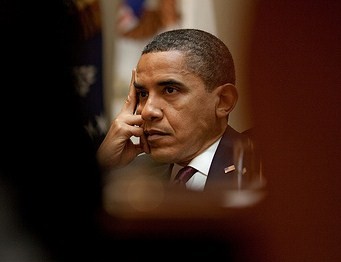AfPak: NPR Confirms Obama’s Secret War In Pakistan

NEWS JUNKIE POST
Sep 23, 2010 at 10:43 amFor quite a while, independent media, including the News Junkie Post (in February 2010), have reported on President Obama’s covert operations within Pakistan’s borders. The confirmation of this, is now coming simultaneously from Bob Woodward and National Public Radio.
2010 is already the deadliest year in Afghanistan for US and allied troops. So far 530 troops- including more than 300 Americans- have died in 2010. This surge of casualties comes despite the 30,000 troops surge put in place by the Obama administration. The strategy has not worked, and has been marked by various major setbacks: violence has soared, corruption is still rampant and elections have been mired by frauds. However you want to look at it, and despite the surge, the momentum is still with the Taliban.
In his new book, “Obama’s Wars”, Bob Woodward describes an elite strike force 3,000-strong composed of US special forces and Afghan paramilitary created by the CIA. According to Woodward, and now NPR, the unit is conducting covert operations against the Taliban on both sides of the Afghan-Pakistan border.
“NPR has confirmed the existence of the secret Afghan unit with two sources. One US official says the Afghan paramilitary force operates in small units called Counter-terrorism Pursuit Team. This is one of the best Afghan fighting forces, the official said, and it has made major contributions to stability and security.
Past news accounts have described the CIA working with militias and other groups to go after Al-Qaeda. And highly-trained Afghan special forces soldiers already are working closely with American Green Berets to go after Taliban fighters.
What is new here is the supposed work of these secret Afghan teams inside Pakistan, which NPR confirmed with an adviser to the US military in Afghanistan. The revelation will likely complicate diplomacy with Pakistan. Top US military leaders, principally Joint Chiefs Chairman Admiral Mullen, have worked hard to improve relationships with Pakistani security officials.
It is uncertain what, if any, major contributions these covert Afghan teams have achieved against the Taliban, either in Afghanistan or in Pakistan. Even with such teams, the US has had to send 30,000 additional troops to Afghanistan because the Taliban has grown in strength. The challenge of fighting Taliban across the border in Pakistan remains. The American military command in Afghanistan is now pressing for more US drone attacks against Taliban safe havens in Pakistan.” said Tom Bowman reporting for NPR’s “All Things Considered” on Wednesday.
The confirmation of the murkiness of the AfPak conundrum is thankfully fueling some much needed debates in Washington over whether the effort is worth it. In his book, Bob Woodward reveals the division within the Obama administration on the Afghanistan-Pakistan strategy currently at play.
Paul Pillar, a former CIA counter-terrorist operative, says the US ought to look at the current commitment to Afghanistan in rigorous cost-benefit terms. Pillar says Afghanistan is no longer a war of necessity. He says the US does not need to defeat the Afghan Taliban because the group is not a national security threat.
“We are spending $100 Billion a year, as well as an expenditure of blood that is now over 1,200 killed and countless others wounded. And we have lost sight of what this is or what this is not doing to keep Americans safe from terrorism,” says Pillar.
An even harsher critique opposing President Obama’s policies in Afghanistan comes from Matthew Hoh, a former Marine Corps Captain who served in Afghanistan. Hoh argues that Obama’s policies in Afghanistan are the same than the failed policies of George W. Bush. Hoh points out that the US has been doing counterinsurgency since 2004, and that the current strategy is just more of what has failed over the past few years.
“I have a list of quotes from every commanding generals since 2004 in Afghanistan, assuring success, assuring that victory is one year away. They just need more troops and some more time. As every year we add more troops or spend more money, the Taliban grow in size, and support for the Karzai government decreases. The conflict is getting worse along any measures you want to measure: Whether it is IEDs, civilian casualties and coalition casualties,” says Hoh.
Related Articles
- November 26, 2012 Bradley Manning: Political Prisoner for Truth
- January 11, 2012 US Drone Attacks: Making Pakistan More Unstable
- February 26, 2013 Kerry and Hagel: Can Two Vietnam Vets End the War in Afghanistan?
- June 7, 2010 Yemen: US Strikes Used Cluster Bombs And Killed 41 Civilians
- February 16, 2010 AfPak: Obama’s Covert War In Pakistan
- June 9, 2011 US Drone Strikes And Bin Laden’s Killing: Turning Pakistan Into A Time-bomb













You must be logged in to post a comment Login